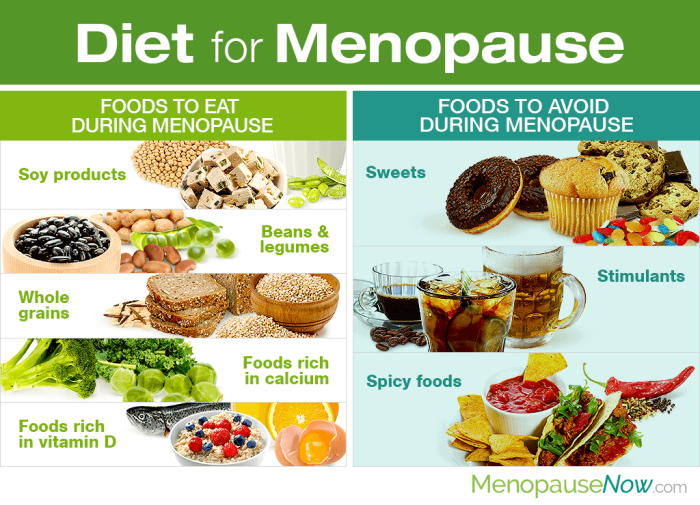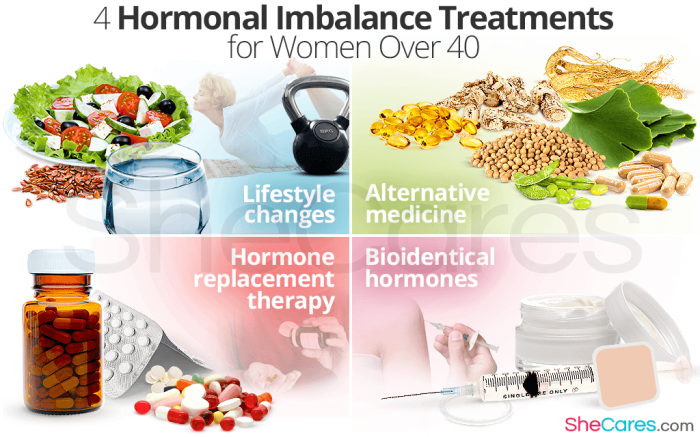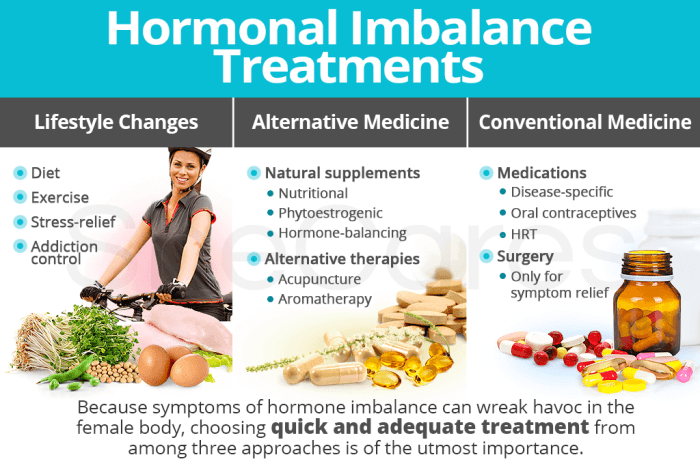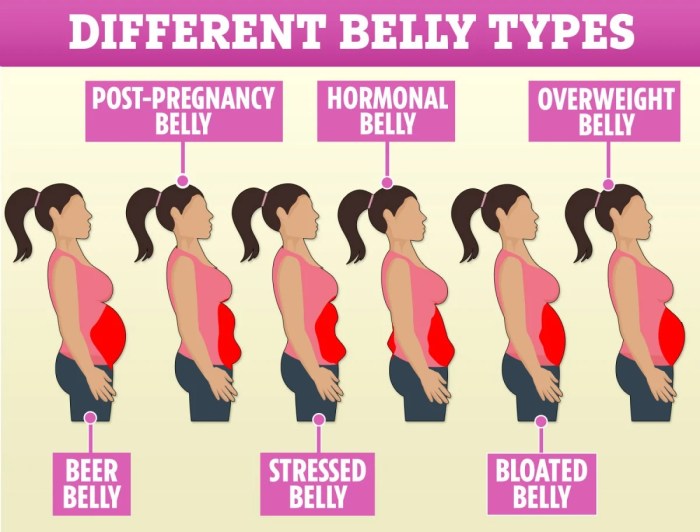Best diet for hormonal weight gain over 40 – As we gracefully navigate the passage of time, our bodies undergo a symphony of hormonal shifts, and for many women over 40, these changes can manifest in the form of unwanted weight gain. In this comprehensive guide, we’ll embark on a journey to decipher the hormonal labyrinth, unraveling the secrets to shedding those extra pounds and reclaiming your vibrant self.
Join us as we delve into the intricate interplay between hormones, diet, and lifestyle, empowering you with evidence-based strategies to conquer hormonal weight gain and emerge as a radiant and confident woman in your prime.
Explain the hormonal changes that occur over 40 that can contribute to weight gain.: Best Diet For Hormonal Weight Gain Over 40
As we age, our bodies undergo several hormonal changes that can affect our weight. For women, these changes begin around the age of 40 when they enter perimenopause, the transition to menopause. During this time, the ovaries gradually produce less estrogen and progesterone, two hormones that play a key role in weight regulation.
Role of Estrogen
Estrogen helps to regulate metabolism, appetite, and body composition. It increases the production of thyroid hormones, which are responsible for boosting metabolism. Estrogen also helps to suppress appetite and promotes the distribution of fat in the hips and thighs rather than the abdomen.
Role of Progesterone, Best diet for hormonal weight gain over 40
Progesterone helps to balance the effects of estrogen. It helps to reduce fluid retention and bloating, which can contribute to weight gain. Progesterone also helps to regulate appetite and mood, which can influence food choices and eating habits.
Role of Thyroid Hormones
Thyroid hormones are produced by the thyroid gland and play a crucial role in metabolism. As we age, thyroid function can decline, leading to a decrease in metabolism and weight gain. Hypothyroidism, an underactive thyroid gland, is more common in women over 40 and can contribute to weight gain, fatigue, and other symptoms.
Dietary Considerations
Maintaining a healthy weight over 40 requires mindful eating habits that support hormonal balance. Let’s explore nutrient-rich foods and dietary guidelines that can aid in weight management during this life stage.
Ready to tackle that stubborn hormonal weight gain after 40? Look no further! Check out these Weight loss tips for women over 40 and discover the best diet to help you shed those extra pounds and reclaim your youthful figure.
Don’t let hormonal imbalances hold you back – embrace the power of the right diet and get ready to feel your best!
Limiting processed foods, sugary drinks, and unhealthy fats is crucial. These foods can disrupt hormonal balance, promote inflammation, and contribute to weight gain. Instead, focus on consuming whole, unprocessed foods that provide essential nutrients.
Nutrient-Rich Foods for Hormonal Balance
- Fruits and Vegetables:Rich in antioxidants, fiber, and vitamins, fruits and vegetables help regulate blood sugar levels and reduce inflammation.
- Lean Protein:Protein supports hormone production, promotes satiety, and helps preserve muscle mass.
- Whole Grains:Fiber in whole grains slows down digestion, keeps you feeling full, and helps balance blood sugar levels.
- Healthy Fats:Monounsaturated and polyunsaturated fats, found in avocados, olive oil, and nuts, support hormone production and reduce inflammation.
Intermittent Fasting
Intermittent fasting is an eating pattern that involves alternating periods of eating and fasting. It has become increasingly popular as a way to lose weight and improve health. There is some evidence that intermittent fasting may be particularly beneficial for people over 40 who are experiencing hormonal weight gain.One
of the main reasons why intermittent fasting may be helpful for hormonal weight gain is that it can help to improve insulin sensitivity. Insulin is a hormone that helps the body to use glucose for energy. As we age, our bodies become less sensitive to insulin, which can lead to weight gain.
Intermittent fasting can help to improve insulin sensitivity, which can make it easier to lose weight and keep it off.In addition to improving insulin sensitivity, intermittent fasting may also help to reduce levels of cortisol, a stress hormone that can lead to weight gain.
Cortisol levels tend to increase as we age, and this can make it more difficult to lose weight. Intermittent fasting can help to reduce cortisol levels, which can make it easier to lose weight and keep it off.There are several different methods of intermittent fasting.
Some of the most popular methods include:*
-*Alternate-day fasting
If you’re over 40 and struggling with hormonal weight gain, you’re not alone. The good news is that there are things you can do to lose weight and keep it off. For more tips on how to lose weight over 40 and keep it off, check out this article: How to lose weight over 40 and keep it off . Once you’ve read that, come back here for more on the best diet for hormonal weight gain over 40.
This involves fasting every other day. On fasting days, you can either eat nothing or eat a very small amount of food.
-
-*Time-restricted feeding
This involves eating all of your meals within a certain window of time each day. For example, you might eat all of your meals between 8am and 6pm each day.
-*5
2 fasting: This involves eating normally for five days of the week and fasting for two days of the week. On fasting days, you can either eat nothing or eat a very small amount of food.
-*Warrior diet
This involves fasting for most of the day and eating one large meal in the evening.
There is no one-size-fits-all approach to intermittent fasting. The best method for you will depend on your individual needs and preferences. It is important to start slowly and gradually increase the length of your fasts over time. It is also important to stay hydrated and listen to your body.
If you feel hungry or lightheaded, you should break your fast and eat something.Intermittent fasting can be a safe and effective way to lose weight and improve your health. However, it is important to talk to your doctor before starting any new diet or exercise program.
Exercise
Regular exercise is crucial for hormonal weight gain, as it helps improve insulin sensitivity, boost metabolism, and reduce stress levels. Aim for at least 150 minutes of moderate-intensity exercise or 75 minutes of vigorous-intensity exercise per week.
Types of exercise that are most effective for weight loss include:
- Cardiovascular exercise (e.g., brisk walking, running, cycling)
- Strength training (e.g., weightlifting, resistance band exercises)
- High-intensity interval training (HIIT)
Sample Exercise Plan
Here’s a sample exercise plan tailored to individuals over 40:
- Monday: Cardio (30 minutes) + Strength training (30 minutes)
- Tuesday: Rest
- Wednesday: Cardio (20 minutes) + HIIT (10 minutes)
- Thursday: Strength training (30 minutes)
- Friday: Cardio (25 minutes) + Core exercises (15 minutes)
- Saturday: Active rest (e.g., yoga, walking)
- Sunday: Rest
Remember to consult with your doctor before starting any new exercise program.
– Explain the connection between stress and hormonal weight gain, including the role of cortisol and other stress hormones.
Stress is a major contributor to weight gain, especially over the age of 40. When you’re stressed, your body releases hormones like cortisol and adrenaline. These hormones can lead to increased appetite, cravings for unhealthy foods, and difficulty sleeping. All of these factors can contribute to weight gain.
Cortisol is a particularly important hormone when it comes to weight gain. Cortisol is released in response to stress and helps to mobilize energy stores. However, if cortisol levels are chronically elevated, it can lead to weight gain, especially around the abdomen.
Sleep
Sleep is crucial for maintaining hormonal balance, particularly as we age. Adequate sleep helps regulate hormones that affect metabolism, appetite, and overall well-being.
As we age, our sleep patterns and quality often change. Hormonal fluctuations, such as declining estrogen and progesterone levels in women, can disrupt sleep. Additionally, stress and lifestyle factors can further impact sleep duration and quality.
Optimal Sleep Duration and Quality
For individuals over 40, the optimal sleep duration is 7-9 hours per night. However, the quality of sleep is equally important. Aim for high-quality sleep with minimal disruptions and night awakenings.
As we age, our sleep patterns may shift, leading to earlier bedtimes and waking times. It’s important to adjust our sleep schedule accordingly to ensure we’re getting enough quality sleep.
Hormonal changes after 40 can make it tough to lose weight. Learn the best diet to combat hormonal weight gain. But even with the right diet, there are unique challenges women over 40 face, such as slower metabolism and hormonal imbalances.
Read more about Weight loss challenges for women over 40 and find strategies to overcome them. Don’t let age be an excuse – find the best diet for hormonal weight gain over 40 and achieve your weight loss goals.
Tips for Improving Sleep Hygiene
Establishing a regular sleep schedule is essential for regulating our body’s natural sleep-wake cycle. Stick to your schedule as much as possible, even on weekends.
Create a conducive sleep environment by ensuring your bedroom is dark, quiet, and cool. Consider using blackout curtains, a white noise machine, or earplugs to minimize distractions.
Avoid caffeine and alcohol before bed, as they can interfere with sleep quality. Exercise regularly, but avoid exercising too close to bedtime, as it can make it harder to fall asleep.
Supplements
Supplements can be beneficial for hormonal weight gain over 40, but it’s crucial to consult a healthcare professional before taking any.
Some supplements that may help include:
Fish Oil
- Contains omega-3 fatty acids, which have anti-inflammatory properties that may improve insulin sensitivity and reduce inflammation-related weight gain.
Vitamin D
- Supports calcium absorption and bone health. Vitamin D deficiency has been linked to increased belly fat.
Magnesium
- Essential for over 300 bodily functions, including energy production and muscle relaxation. Magnesium deficiency can lead to fatigue and impaired sleep, which can contribute to weight gain.
Other Lifestyle Factors
In addition to dietary and exercise choices, other lifestyle factors can influence hormonal weight gain over 40. These include:
Smoking
Smoking increases the production of cortisol, a stress hormone that can lead to weight gain. It also damages the cells that produce hormones, which can further disrupt hormonal balance.
Alcohol Consumption
Excessive alcohol consumption can interfere with the production of sex hormones, such as estrogen and testosterone, which can lead to weight gain. Alcohol also increases the production of cortisol.
Environmental Toxins
Exposure to environmental toxins, such as BPA and phthalates, can disrupt hormonal balance and contribute to weight gain. These toxins can mimic the effects of hormones in the body, leading to hormonal imbalances.
Tips for Making Healthy Lifestyle Choices
- Quit smoking.
- Limit alcohol consumption.
- Avoid exposure to environmental toxins.
- Choose a healthy diet and exercise regularly.
- Manage stress levels.
- Get enough sleep.
Sample Meal Plan
Here’s a sample meal plan that includes foods that support hormonal balance and weight loss:
Breakfast
- 1 cup oatmeal with 1/4 cup berries and 1/4 cup nuts
- 1 slice whole-wheat toast with 1 tablespoon peanut butter
- 1 cup Greek yogurt with 1/4 cup fruit
Lunch
- 1 cup salad with grilled chicken or fish, 1/2 cup vegetables, and 1/4 cup beans
- 1 cup soup and 1/2 sandwich on whole-wheat bread
- 2 cups chili with 1/2 cup brown rice
Dinner
- 4 ounces grilled salmon with 1 cup roasted vegetables and 1 cup brown rice
- 1 cup chicken stir-fry with 1 cup vegetables and 1 cup brown rice
- 1 cup lentil soup with 1 slice whole-wheat bread
Snacks
- 1/2 cup fruit
- 1 cup vegetables
- 1 ounce nuts
These are just a few examples, and you can adjust the meal plan to fit your individual needs and preferences. It’s important to focus on eating whole, unprocessed foods that are rich in nutrients.
Tips for Success
Maintaining a healthy weight over 40 requires dedication, consistency, and a positive mindset. Here are some practical tips to help you achieve your goals:
Consistency is Key
Consistency is crucial for long-term weight management. Make gradual changes to your diet and exercise routine that you can sustain over time. Avoid drastic measures or fad diets that are difficult to maintain.
Patience and Self-Compassion
Weight loss is a journey that takes time and effort. Be patient with yourself and don’t get discouraged by setbacks. Practice self-compassion and celebrate your progress along the way.
Seek Support
Connect with others who are on a similar journey. Join support groups, consult with a registered dietitian or therapist, or seek encouragement from friends and family.
Create a Healthy Environment
Surround yourself with healthy choices by stocking your fridge with nutritious foods and creating a supportive home environment. Limit temptations and distractions that may hinder your progress.
Table: Strategies for Maintaining a Healthy Weight Over 40
| Strategy | Description ||—|—|| Set Realistic Goals | Aim for gradual, sustainable weight loss of 1-2.5 pounds per week. || Focus on Nutrient-Rich Foods | Choose fruits, vegetables, whole grains, and lean protein to nourish your body. || Hydrate Adequately | Drink plenty of water throughout the day to support metabolism and curb cravings.
|| Get Regular Exercise | Engage in at least 150 minutes of moderate-intensity exercise per week. || Manage Stress | Practice stress-reducing techniques such as yoga, meditation, or spending time in nature. || Get Enough Sleep | Aim for 7-9 hours of quality sleep each night to regulate hormones and support weight management.
|| Monitor Your Progress | Track your weight, measurements, and overall well-being to stay motivated and make adjustments as needed. |
Motivational Quotes
- “The journey of a thousand miles begins with a single step.”
- Lao Tzu
- “It’s not about being perfect, it’s about making progress.”
- Unknown
- “Believe you can and you’re halfway there.”
- Theodore Roosevelt
- “Don’t give up on your dreams, just adjust your sails.”
- H. Jackson Brown Jr.
- “The greatest glory in living lies not in never falling, but in rising every time we fall.”
- Nelson Mandela
Table
Incorporating nutrient-rich foods into your diet is essential for supporting hormonal balance. Here’s a table showcasing some of these beneficial foods:
The following table provides a comprehensive list of nutrient-rich foods that support hormonal balance. These foods are rich in essential vitamins, minerals, antioxidants, and fiber, which are crucial for maintaining hormonal health and overall well-being.
| Food Name | Nutrients Provided | Serving Size |
|---|---|---|
| Leafy Greens (spinach, kale, collard greens) | Vitamin A, Vitamin C, Calcium, Iron, Fiber | 1 cup |
| Berries (blueberries, strawberries, raspberries) | Antioxidants, Vitamin C, Fiber | 1 cup |
| Fatty Fish (salmon, tuna, mackerel) | Omega-3 Fatty Acids, Vitamin D, Protein | 3 ounces |
| Nuts and Seeds (almonds, walnuts, chia seeds) | Healthy Fats, Protein, Fiber | 1/4 cup |
| Legumes (beans, lentils, chickpeas) | Protein, Fiber, Iron, Folate | 1 cup |
| Whole Grains (brown rice, quinoa, oats) | Fiber, B Vitamins, Iron | 1/2 cup cooked |
| Avocado | Healthy Fats, Fiber, Potassium | 1/2 avocado |
| Sweet Potatoes | Vitamin A, Vitamin C, Fiber | 1 medium |
| Yogurt (Greek or plain) | Protein, Calcium, Probiotics | 1 cup |
| Eggs | Protein, Choline, Vitamin D | 2 large eggs |
12. Table
Intermittent Fasting Methods
Intermittent fasting is a pattern of eating that involves alternating periods of fasting and eating. There are many different intermittent fasting methods, each with its own unique benefits and drawbacks. The following table provides an overview of some of the most popular intermittent fasting methods:
Note:It’s important to consult with a healthcare professional before starting any intermittent fasting regimen, especially if you have any underlying health conditions.
| Method Name | Fasting Period | Eating Period | Potential Benefits | Evidence | Additional Notes |
|---|---|---|---|---|---|
| 16/8 Method | 16 hours | 8 hours | Weight loss, improved insulin sensitivity, reduced inflammation | Studies have shown that the 16/8 method can lead to significant weight loss and improvements in insulin sensitivity. | Avoid sugary drinks and processed foods during the fasting period. |
| 5:2 Diet | 2 days | 5 days | Weight loss, improved blood sugar control, reduced risk of chronic diseases | Research suggests that the 5:2 diet can help with weight loss and improve blood sugar control in people with type 2 diabetes. | On fasting days, consume around 500-600 calories. |
| Alternate-Day Fasting | 24 hours | 24 hours | Weight loss, improved autophagy, reduced oxidative stress | Studies have demonstrated that alternate-day fasting can promote weight loss and enhance cellular health. | Drink plenty of water and electrolytes during the fasting period. |
Table: Stress-Reducing Techniques
Stress is a major contributor to hormonal weight gain. It can lead to increased cortisol levels, which can promote belly fat storage and make it harder to lose weight. There are many different stress-reducing techniques that can help to manage stress and reduce cortisol levels.
Stress-Reducing Techniques
| Technique | Description | Benefits | Difficulty Level |
|---|---|---|---|
| Mindfulness Meditation | Paying attention to the present moment without judgment | Reduces stress, improves focus, and promotes relaxation | Beginner |
| Deep Breathing Exercises | Slow, controlled breathing exercises | Reduces stress, calms the nervous system, and improves heart health | Beginner |
| Yoga | A mind-body practice that combines physical postures, breathing exercises, and meditation | Reduces stress, improves flexibility, and promotes relaxation | Beginner to Intermediate |
| Tai Chi | A gentle, low-impact exercise that combines slow, flowing movements and deep breathing | Reduces stress, improves balance, and promotes relaxation | Beginner to Intermediate |
| Massage Therapy | A form of bodywork that involves the application of pressure and manipulation to the muscles | Reduces stress, promotes relaxation, and relieves muscle tension | Intermediate |
| Aromatherapy | The use of essential oils to promote relaxation and reduce stress | Reduces stress, improves mood, and promotes sleep | Beginner |
| Music Therapy | Listening to or playing music to reduce stress and promote relaxation | Reduces stress, improves mood, and promotes sleep | Beginner |
| Spending Time in Nature | Being in nature has been shown to reduce stress and promote relaxation | Reduces stress, improves mood, and promotes creativity | Beginner |
| Spending Time with Loved Ones | Spending time with loved ones can help to reduce stress and promote relaxation | Reduces stress, improves mood, and promotes social connection | Beginner |
| Exercise | Regular exercise is a great way to reduce stress and improve overall health | Reduces stress, improves mood, and promotes sleep | Beginner to Advanced |
Table: Sleep Hygiene Tips
Sleep is essential for overall health and well-being, and it plays a crucial role in regulating hormones that affect weight. Here’s a table listing some tips for improving sleep hygiene:
| Tip | Description | Benefits |
|---|---|---|
| Establish a regular sleep-wake cycle | Go to bed and wake up around the same time each day, even on weekends. | Helps regulate the body’s natural sleep-wake cycle (circadian rhythm). |
| Create a relaxing bedtime routine | Engage in calming activities before bed, such as taking a warm bath, reading, or listening to soothing music. | Helps signal the body that it’s time to sleep. |
| Optimize your sleep environment | Make sure your bedroom is dark, quiet, and cool. | Creates an environment conducive to sleep. |
| Avoid caffeine and alcohol before bed | Caffeine and alcohol can interfere with sleep. | Promotes better sleep quality. |
| Get regular exercise | Regular physical activity can improve sleep quality, but avoid exercising too close to bedtime. | Helps regulate the body’s natural sleep-wake cycle and reduces stress. |
Table
Here’s a look at some lifestyle factors that can influence hormonal weight gain and tips for making healthier choices:
| Lifestyle Factor | Potential Impact | Tips for Healthy Choices |
|---|---|---|
| Sleep Deprivation | Increases cortisol levels, promotes fat storage | Aim for 7-9 hours of quality sleep each night |
| Chronic Stress | Elevates cortisol and other stress hormones, leading to increased appetite and fat storage | Engage in stress-reducing activities like yoga, meditation, or spending time in nature |
| Alcohol Consumption | Impairs sleep, increases inflammation, and alters hormone balance | Limit alcohol intake or avoid it altogether |
| Smoking | Increases stress hormones, reduces leptin sensitivity, and impairs metabolism | Quit smoking or seek support to reduce nicotine intake |
| Sedentary Lifestyle | Decreases metabolism, promotes fat storage | Engage in regular physical activity, aim for at least 150 minutes of moderate-intensity exercise per week |
Conclusive Thoughts
Remember, the journey to hormonal harmony and weight management is a marathon, not a sprint. Embrace each step with patience and self-compassion, and you will undoubtedly triumph over the challenges that lie ahead. Let this guide be your steadfast companion, illuminating your path towards a healthier, happier, and more fulfilling life beyond 40.
Query Resolution
Can hormonal weight gain be reversed?
Yes, with the right strategies, hormonal weight gain can be reversed. This involves addressing the underlying hormonal imbalances, adopting a balanced diet, engaging in regular exercise, and managing stress effectively.
Is it safe to lose weight quickly after 40?
Rapid weight loss is generally not recommended, especially after the age of 40. Aim for a gradual weight loss of 1-2.5 pounds per week to minimize the risk of health complications and ensure sustainable results.
What are the best exercises for hormonal weight gain?
Resistance training, such as weightlifting or bodyweight exercises, is highly effective for building muscle mass, which can boost metabolism and support weight loss. Additionally, cardiovascular exercises like brisk walking, running, or cycling can help burn calories and improve overall fitness.




